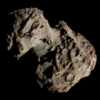C/1989 Y1 (Skorichenko–George)
| Discovery[1][2] | |
|---|---|
| Discovered by | Boris Skoritchenko Douglas B. George |
| Discovery date | 17 December 1989 |
| Designations | |
| 1990 VI 1989e1 | |
| Orbital characteristics[3][4] | |
| Epoch | 24 February 1990 (JD 2447946.5) |
| Observation arc | 1,008 days (2.76 years) |
| Number of observations | 106 |
| Aphelion | 1,188.42 AU |
| Perihelion | 1.569 AU |
| Semi-major axis | 594.994 AU |
| Eccentricity | 0.997363 |
| Orbital period | 14,514 years |
| Inclination | 59.3660 |
| 279.998° | |
| Argument of periapsis | 137.862° |
| Last perihelion | 11 April 1990 |
| Earth MOID | 0.7346 AU |
| Jupiter MOID | 1.8047 AU |
| Physical characteristics[3] | |
| Comet total magnitude (M1) | 5.3 |
| Comet nuclear magnitude (M2) | 11.9 |
| 9–10 (1990 apparition) | |
Comet Skorichenko–George (sometimes spelled Scorichenko–George), formally designated as C/1989 Y1, 1990 VI, and 1989e1, is a non-periodic comet co-discovered by astronomers Boris Skorichenko and Doug George on December 17, 1989. It has a hyperbolic trajectory around the Sun,[3] but still weakly bound to it by its barycenter.[4]
Discovery and observations
[edit]It was discovered on December 17, 1989 by Doug George of Kanata (near Ottawa), Ontario, Canada, and Soviet astronomer Boris Skoritchenko (Mezmay, Krasnodar Krai). Skoritchenko was using 8×20 binoculars,[5] whilst George was using a 16" reflector and had searched for 65 hours[6]. The comet was magnitude 10.5 in the northern evening sky. It passed its perihelion on April 11, 1990 at a distance of 1.57 AU (235 million km),[3] and remained visible as a magnitude 9–10 object in the night sky until April 1990
C2 emission bands were observed in the comet Skorichenko-George. Unlike most comets, Skorichenko–George did not produce a tail.[7] Its coma remained consistently diffuse, estimated to be around 190,000–290,000 km (120,000–180,000 mi) in diameter.[7]
References
[edit]- ^ D. W. Green (19 December 1989). "COMET GEORGE (1989e1)". Central Bureau for Astronomical Telegrams. 4925. Bibcode:1989IAUC.4925....1G.
- ^ D. W. Green (23 December 1989). "COMET SKORICHENKO-GEORGE (1989e1)". Central Bureau for Astronomical Telegrams. 4929. Bibcode:1989IAUC.4929....1C.
- ^ a b c d "C/1989 Y1 (Skorichenko–George) – JPL Small-Body Database Lookup". ssd.jpl.nasa.gov. Jet Propulsion Laboratory. Retrieved 15 November 2024.
- ^ a b Horizons output. "Barycentric Osculating Orbital Elements for Comet C/1989 Y1 (Skorichenko-George)". Retrieved 4 February 2011. (Solution using the Solar System Barycenter and barycentric coordinates. Select Ephemeris Type:Elements and Center:@0)
- ^ V. Korneyev. "C/1989 Y1 (Skorichenko-George)" (in Russian). Archived from the original on 15 March 2005.
- ^ D. Machholz (February 1990). "SAC News: Comet Comments" (PDF). Saguaro Astronomy Club. No. 157. Archived from the original (PDF) on 5 January 2011.
- ^ a b D. Machholz (August 1997). "The apparition of comet Skorichenko-George (1989e1 = 1990 VI)". Strolling Astronomer. 39 (4): 177–189. Bibcode:1997JALPO..39..177M.


